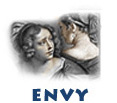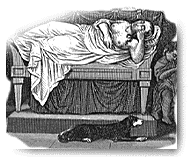|


Solomon
b. Judah Ibn Gabirol of Cordova, one of the greatest medieval Spanish
Jewish poets (first half of 11th century), did more than anyone else
for the dissemination of Hebrew poetry. He was active in all the fields
of religious lyric, producing hymns and meditations, selihot
(penitential prayers), prayers, qinot (dirges) and hopeful,
longing visions of the future in varied forms and styles. The most
valuable poetic achievement, in which religious, national and philosophical
writing are combined into a harmonious whole, is his great didactic
poem Keter Malkhut,
"The Kingly Crown," whose concluding confession is included
in the Yom Kippur service.
In addition to his religious poetry, Ibn Gabirol produced philosophical
works, including Fountain of Life (which was hotly debated
among Christian philosophers although it had little influence on Jewish
thought), and treatises on ethics.
One of Gabirol’s earliest literary works, Mibhar ha-Peninim
(The Choice of Pearls), was a small book of maxims derived almost
entirely from non-Jewish sources. This very popular publication, written
originally in Arabic, enjoyed enduring popularity throughout Israel
in its later Hebrew translation. We include here the maxim “Concerning
Envy.” |
Envy is to men like bodily ailments – it leads to consumption. I have not
seen one who hurts himself more than does the envious person; his mourning is
unceasing, his soul grieves, his intellect deteriorates and his heart is disquieted.
Everybody can eat with satisfaction except the man who envies good fortune;
for he is only pleased by the misfortune (of others).
Every enmity has the possibility of cure, except the enmity of he who hates
you from envy. Envy not your brother for what he has; he enjoys his life while
you are sated with vexation and unrest. You have sufficient revenge of the envious
person that he grieves over you happiness and good fortunes.

"Envy
is rot to the bones."
(Proverbs 14:30)
| Ibn
Gabirol’s treatise on ethics, The Improvement of Moral Qualities
(written originally in Arabic; 1045), is the first systematic account
by any Jewish author of the various human impulses, and the manner
in which they can be channeled into virtue or neglected in favor
of vice. The most striking feature of the treatise is that it never
so much as mentions the Talmudic sages, and instead frequently quotes
the Greek and Arabic philosophies. While the excerpt above focuses
on the envy of others good fortune or achievements, the paragraph
“On Envy” in this treatise deals with envy of physical
possessions. |
Envy is an
offshoot of wrath. Most rational beings are not exempt from it: but it is
in them all, for we see men seeking to imitate the actions of their companions.
For instance, when one (man) sees that his friend has acquired some worldly
gain, mineral, animal or vegetable, or other possessions, he likewise endeavors
to acquire similar things, although he should be able to dispense with them
or compensate himself with other things in their stead. Let him not protract
his endeavor, not set his heart upon attaining such possessions.

"Envy,
greed and thirst for honor
remove a man from the world."
(Ethics of the
Fathers 4:28)
|